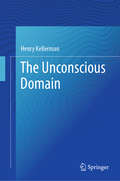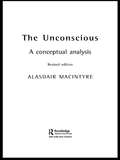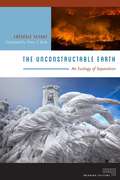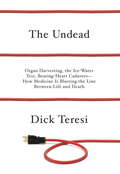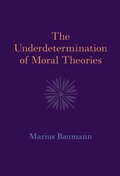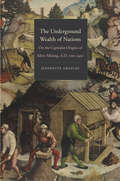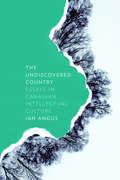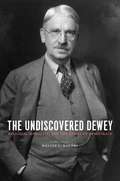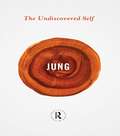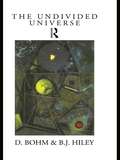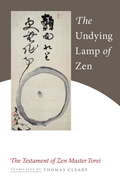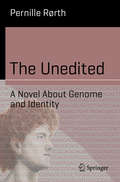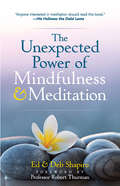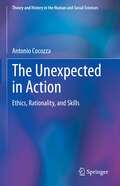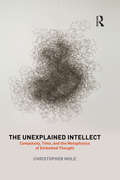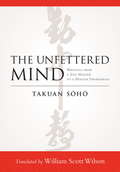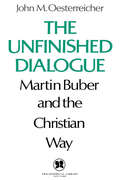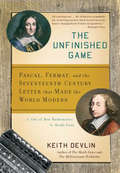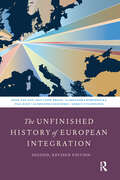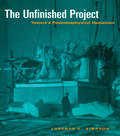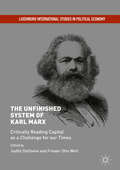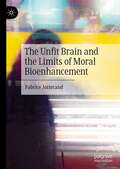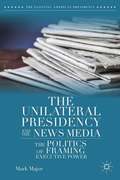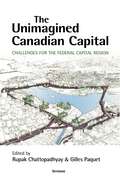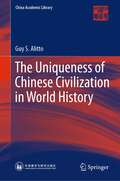- Table View
- List View
The Unconscious Domain (Springerbriefs In Psychology Ser.)
by Henry KellermanThis book enumerates the components of the unconscious domain (or realm), and attempts to uncover the proposed communicational network of its operation — a communicational network that is able to link inherent participating components of this realm. It is often the case that theoreticians and clinical practitioners refer to the unconscious or unconscious material in a way that implies the sense of it all rather than a specific definition, broadly describing it as “material which is out of one’s awareness.” This volume therefore examines the complex existence of the entire unconscious realm embraced in an evolutionary historical context, defined here as the 'unconscious domain'.
The Unconscious: A Conceptual Analysis (Key Texts Ser.)
by Alasdair Chalmers MacIntyreThis edition includes a substantial new preface by the author, in which he discusses repression, determinism, transference, and practical rationality, and offers a comparison of Aristotle and Lacan on the concept of desire. MacIntyre takes the opportunity to reflect both on the reviews and criticisms of the first edition and also on his own philosophical stance.
The Unconstructable Earth: An Ecology of Separation (Meaning Systems)
by Frédéric NeyratWinner, Grand Prize, French Voices Award for Excellence in Publication and TranslationThe Space Age is over? Not at all! A new planet has appeared: Earth. In the age of the Anthropocene, the Earth is a post-natural planet that can be remade at will, controlled and managed thanks to the prowess of geoengineering. This new imaginary is also accompanied by a new kind of power—geopower—that takes the entire Earth, in its social, biological and geophysical dimensions, as an object of knowledge, intervention, and governmentality. In short, our rising awareness that we have destroyed our planet has simultaneously provided us not with remorse or resolve but with a new fantasy: that the Anthropocene delivers an opportunity to remake our terrestrial environment thanks to the power of technology.Such is the position we find ourselves in, when proposals for reengineering the earth’s ecosystems and geosystems are taken as the only politically feasible answer to ecological catastrophe. Yet far from being merely the fruit of geo-capitalism, this new grand narrative of geopower has also been activated by theorists of the constructivist turn—ecomodernist, postenvironmentalist, accelerationist—who have likewise called into question the great divide between nature and culture. With the collapse of this divide, a cyborg, hybrid, flexible nature has been built, an impoverished nature that does not exist without being performed by technologies that proliferate within the space of human needs and capitalist imperatives. Underneath this performative vision resides a hidden anaturalism denying all otherness to nature and the Earth, no longer by externalizing it as a thing to be dominated, but by radically internalizing it as something to be digested. Constructivist ecology thus finds itself in no position to confront the geoconstructivist project, with its claim that there is no nature and its aim to replace Earth with Earth 2.0.Against both positions, Neyrat stakes out the importance of the unconstructable Earth. Against the fusional myth of technology over nature, but without returning to the division between nature and culture, he proposes an “ecology of separation” that acknowledges the wild, subtractive capacity of nature. Against the capitalist, technocratic delusion of earth as a constructible object, but equally against an organicism marked by unacknowledged traces of racism and sexism, Neyrat shows what it means to appreciate Earth as an unsubstitutable becoming: a traject that cannot be replicated in a laboratory. Underway for billions of years, withdrawing into the most distant past and the most inaccessible future, Earth escapes the hubris of all who would remake and master it.This remarkable book, which will be of interest to those across the humanities, natural sciences, and social sciences, from theorists to shapers of policy, recasts the earth as a singular trajectory that invites humans to turn political ecology into a geopolitics.
The Undead: Organ Harvesting, the Ice-Water Test, Beating Heart Cadavers--How Medicine Is Blurring the Line Between Life and Death
by Dick TeresiImportant and provocative, The Undead examines why even with the tools of advanced technology, what we think of as life and death, consciousness and nonconsciousness, is not exactly clear and how this problem has been further complicated by the business of organ harvesting.Dick Teresi, a science writer with a dark sense of humor, manages to make this story entertaining, informative, and accessible as he shows how death determination has become more complicated than ever. Teresi introduces us to brain-death experts, hospice workers, undertakers, coma specialists and those who have recovered from coma, organ transplant surgeons and organ procurers, anesthesiologists who study pain in legally dead patients, doctors who have saved living patients from organ harvests, nurses who care for beating-heart cadavers, ICU doctors who feel subtly pressured to declare patients dead rather than save them, and many others. Much of what they have to say is shocking. Teresi also provides a brief history of how death has been determined from the times of the ancient Egyptians and the Incas through the twenty-first century. And he draws on the writings and theories of celebrated scientists, doctors, and researchers--Jacques-Bénigne Winslow, Sherwin Nuland, Harvey Cushing, and Lynn Margulis, among others--to reveal how theories about dying and death have changed. With The Undead, Teresi makes us think twice about how the medical community decides when someone is dead.
The Underdetermination of Moral Theories
by Marius BaumannIn normative ethics, a small number of moral theories, such as Kantianism or consequentialism, take centre stage. Conventional wisdom has it that these individual theories posit very different ways of looking at the world. In this book Marius Baumann develops the idea that just as scientific theories can be underdetermined by data, so can moral theories be underdetermined by our considered judgments about particular cases. Baumann goes on to ask whether moral theories from different traditions might arrive at the same verdicts while remaining explanatorily incompatible. He applies this idea to recent projects in normative ethics, such as Derek Parfit's On What Matters and so-called consequentializing and deontologizing, and outlines its important implications for our understanding of the relationship between the main moral traditions as well as the moral realism debate. This title is also available as Open Access on Cambridge Core.
The Underground Wealth of Nations: On the Capitalist Origins of Silver Mining, A.D. 1150-1450 (Yale Series in Economic and Financial History)
by Jeannette GraulauSilver mining was a capitalist business long before the supposed origin of modern capitalism Hundreds of years before a sixteenth‑century crisis in European agriculture led to the origins of capital, investment, and finance, the silver mining industry exhibited many of the features of modern capitalism. Silver mines were large‑scale businesses that demanded large investments and steady cash flow, achieved by spreading that risk through fungible shares and creating legal structures to protect entrepreneurs from financial disaster. Jeannette Graulau argues that mining preceded agriculture as the first true capitalist enterprise of the modern world.
The Undiscovered Country: Essays in Canadian Intellectual Culture
by Ian AngusIn this sequence of essays, Ian Angus engages with themes of identity, power, and the nation as they emerge in contemporary English Canadian philosophical thought, seeking to prepare the groundwork for a critical theory of neoliberal globalization. The essays are organized into three parts. The opening part offers a nuanced critique of the Hegelian confidence and progressivism that has come to dominate Canadian intellectual life. Through an analysis of the work of several prominent Canadian thinkers, among them Charles Taylor and C. B. Macpherson, Angus suggests that Hegelian frames of reference are inadequate, failing as they do to accommodate the fact of English Canada’s continuing indebtedness to empire. The second part focuses on national identity and political culture, including the role of Canadian studies as a discipline, adapting its critical method to Canadian political culture. The first two parts culminate in the positive articulation, in Part 3, of author’s own conception, one that is at once more utopian and more tragic than that of the first two parts. Here, Angus develops the concept of locative thought—the thinking of a people who have undergone dispossession, “of a people seeking its place and therefore of a people that has not yet found its place.”
The Undiscovered Dewey: Religion, Morality, and the Ethos of Democracy
by Melvin RogersThe Undiscovered Dewey explores the profound influence of evolution and its corresponding ideas of contingency and uncertainty on John Dewey's philosophy of action, particularly its argument that inquiry proceeds from the uncertainty of human activity. Dewey separated the meaningfulness of inquiry from a larger metaphysical story concerning the certainty of human progress. He then connected this thread to the way in which our reflective capacities aid us in improving our lives. Dewey therefore launched a new understanding of the modern self that encouraged intervention in social and natural environments but which nonetheless demanded courage and humility because of the intimate relationship between action and uncertainty. Melvin L. Rogers explicitly connects Dewey's theory of inquiry to his religious, moral, and political philosophy. He argues that, contrary to common belief, Dewey sought a place for religious commitment within a democratic society sensitive to modern pluralism. Against those who regard Dewey as indifferent to moral conflict, Rogers points to Dewey's appreciation for the incommensurability of our ethical commitments. His deep respect for modern pluralism, argues Rogers, led Dewey to articulate a negotiation between experts and the public so that power did not lapse into domination. Exhibiting an abiding faith in the reflective and contestable character of inquiry, Dewey strongly engaged with the complexity of our religious, moral, and political lives.
The Undiscovered Self (Routledge Great Minds)
by Carl Gustav JungWritten three years before his death, The Undiscovered Self combines acuity with concision in masterly fashion and is Jung at his very best. Offering clear and crisp insights into some of his major theories, such as the duality of human nature, the unconscious, human instinct and spirituality, Jung warns against the threats of totalitarianism and political and social propaganda to the free-thinking individual. As timely now as when it was first written, Jung's vision is a salutary reminder of why we should not become passive members of the herd. With a new foreword by Sonu Shamdasani.
The Undivided Universe: An Ontological Interpretation of Quantum Theory
by David Bohm Basil J. HileyFirst published in 1995. Routledge is an imprint of Taylor & Francis, an informa company.
The Undying Lamp of Zen: The Testament of Zen Master Torei
by Thomas Cleary Torei EnjiThe Undying Lamp of Zen is a pure and powerful distillation of Zen doctrine and practice written by Torei Enji (1721-1792), a Zen master and artist. Torei was best known as one of two "genius assistants" to Hakuin Ekaku, a towering figure in Zen Buddhism who revitalized the Rinzai school, which focuses on koan practice. Torei was responsible for much of the advanced work of Hakuin's later disciples and also helped systemize Hakuin's Zen teachings. The Undying Lamp of Zen includes a range of principles and practices, from the most elementary to the most advanced. It is an indispensable aid to the practice of Rinzai Zen, while also providing tested traditional techniques for public access to Zen experience. Premier translator Thomas Cleary provides a thorough introduction and illuminating footnotes throughout, and his masterful translation lets Torei's distinctive voice shine through; Torei is energetic, no-nonsense, and full of personality. No other English translations of this classic are available and Zen aficionados will want to add this to their collection.
The Unedited: A Novel About Genome and Identity (Science and Fiction)
by Pernille RørthThis novel is set in the near future, where human genome editing has become routine. First adopted to fight a lethal virus, it is now widely used to prevent diseases and favor other traits. Ben, Eiko, Celia, Raphael and Leo have just had their coming-of-age genome reading and are struggling with this new information for each their own reasons. Soon, they are cast into the middle of a crisis that threatens the future of their society and pits it against a parallel, but strictly separated, society where genome manipulation is forbidden on religious grounds. The book includes an essay on the potential of human genome engineering and related genome-based choices.
The Unexpected Power of Mindfulness and Meditation
by Deb Shapiro Ed Shapiro"Ed and Deb bring compassion and heart to a modern world where it is sorely missed." — Ram Dass author of Be Here NowBehind the dramas and conflicts of life, there exists a quiet inner place where mindfulness and meditation can help us reside. The sanity and brilliance of this combination can awaken inner strength, foster kindness and fearlessness, and invite radical change. Discover how to transform your life from the inside out with the profound benefits of a calm and stress-free mind.The Unexpected Power of Mindfulness and Meditation features personal insights from visionary leaders — Matthew Fox, Jon Kabat-Zinn, and Marianne Williamson among them — who discuss their methods of maintaining mental health and happiness.“Treat this book as you would a cookery book. You wouldn't just read recipes; you'd try them out. Like cookery, meditation only makes sense if you experience it.” — His Holiness the Dalai Lama, Nobel Peace Prize laureate"Ed and Deb remind us all just how important it is to look after the health and happiness of the mind. With warmth and humor, they show us how to integrate the timeless qualities of awareness and compassion into everyday life." — Andy Puddicombe, founder of HEADSPACE“Mindfulness is the awareness that arises when we pay attention to the present moment. It accesses us to core aspects of our mind that our very sanity depends on, as does our capacity to live wholeheartedly in this crazy world.” — Jon Kabat-Zinn, mindfulness teacher“I can be as nuts as the next person, living in a world like we live in with the craziness and chaos. It takes work to retain our sanity in the midst of all that, and to me meditation is the most powerful tool for doing so.” — Marianne Williamson, New York Times bestselling author of A Return to Love“Ed and Deb Shapiro are two warm, caring, and capable individuals. Their work makes our planet a safer and more loving place to live.” — Bernie Siegel, M.D., bestselling author of Love, Medicine and Miracles“If there is one book you read about meditation, this should be the one. Hear about some of the cool people who do it, why you should do it, and how.” — Sharon Gannon, Jivamukti Yoga“What an accomplishment! Ed and Deb's profoundly unique book offers a one-stop shop for those engaged in mindfulness and meditation. The direct transmission contained in this book can take us one step further. We find it especially useful to help stabilize spiritual activism in these challenging times and we'll refer it widely.” — John Steiner and Margo King, transpartisan activists“I hope that your work is reaching many. It deserves it and so do they.” — Stephen Levine, international bestselling author “Acceptance of what is, that is meditation. This book will help you make friends with your mind. Ed and Deb are spreading love in the world; be a part of it!” — Parmita Pushman, White Swan Records“The pausing has been profound. It has invited me to arrive in the here and now with my child clients, and to accept whatever happens without judging.” — Megan Cronin Larson, play therapist“The wonderful Shapiros are a conduit of joy and spiritual energy that heals hearts on their subtle level.” — Dr. Lex Hixon, author of Coming Home“Ed and Deb make a connection to their friends' spirit. They then bring their spiritual energy all over the world for world peace.” — Kitaro, Golden Globe Award– and Grammy Award–winning musician
The Unexpected in Action: Ethics, Rationality, and Skills (Theory and History in the Human and Social Sciences)
by Antonio CocozzaThe book is a true knowledge-enhancing project, dealing with the forms of rationality at work in social life, which are so many, varied and complex. Published already in Spanish and Italian, it analyses the role played by rationality through the lens of social theories in order to propose a problematic interpretation of human action. Since there is nothing more practical than a good theory when seeking to understand our society, the book reflects on the theoretical approaches that provide useful categories by means of which to understand and interpret individual, organizational, and institutional action. It proposes an analysis of a wide variety of classics by eminent European and Anglo-American thinkers, such as Dahrendorf, Mannheim, Marx, Popper, Weber, Habermas, Luhmann, Machiavelli, Pareto, Ardigò, Cesareo, Parsons, Schütz, Alexander, Bauman, Beck, Sennett, Antiseri, Boudon, Sen, Simon, to shed light on the relationship between rationality, difficulties in thinking and extra-rationality. Finally, the reasons for unexpected action are investigated as well as the strategic role played by ethics, rationality and skills in postmodern societies on the basis of the contributions of Nussbaum and Piketty.
The Unexplained Intellect: Complexity, Time, and the Metaphysics of Embodied Thought
by Christopher MoleThe relationship between intelligent systems and their environment is at the forefront of research in cognitive science. The Unexplained Intellect: Complexity, Time, and the Metaphysics of Embodied Thought shows how computational complexity theory and analytic metaphysics can together illuminate long-standing questions about the importance of that relationship. It argues that the most basic facts about a mind cannot just be facts about mental states, but must include facts about the dynamic, interactive mental occurrences that take place when a creature encounters its environment. In a discussion that is organised into four clear parts, Christopher Mole begins by examining the mathematics of computational complexity, arguing that the results from complexity theory create a puzzle about how human intelligence could possibly be explained. Mole then uses the tools of analytic metaphysics to draw a distinction between mental states and dynamic mental entities, and shows that, in order to answer the complexity-theoretic puzzle, dynamic entities must be understood to be among the most basic of mental phenomena. The picture of the mind that emerges has important implications for our understanding of intelligence, of action, and of the mind’s relationship to the passage of time. The Unexplained Intellect is the first book to bring insights from the mathematics of computational complexity to bear in an enquiry into the metaphysics of the mind. It will be essential reading for scholars and researchers in the philosophy of mind and psychology, for cognitive scientists, and for those interested in the philosophical importance of complexity.
The Unfettered Mind: Writings from a Zen Master to a Master Swordsman
by William Scott Wilson Takuan SohoThis classic samurai-era text fused Japanese swordsmanship with Zen and influenced the direction that the art has taken ever since. Written by the seventeenth-century Zen master Takuan Soho (1573-1645), The Unfettered Mind is a book of advice on swordsmanship and the cultivation of right mind and intention. It was written as a guide for the samurai Yagyu Munenori, who was a great swordsman and rival to the legendary Miyamoto Musashi. Takuan was a giant in the history of Zen; he was also a gardener, calligrapher, poet, author, adviser to samurai and shoguns, and a pivotal figure in Zen painting. He was known for his brilliance and acerbic wit. In these succinct and pointed essays, Takuan is concerned primarily with understanding and refining the mind--both generally and when faced with conflict. The Unfettered Mind was a major influence on the classic manifestos on swordsmanship that came after it, including Miyamoto Musashi's Book of Five Rings and Yagyu Munenori's Life-Giving Sword.
The Unfinished Dialogue
by John M. OesterreicherIn The Unfinished Dialogue: Martin Buber and the Christian Way, author John M. Oesterreicher analyzes Buber's philosophies and writings in this concise book. Oesterreicher's analyses are the perfect companion to understanding Buber in his own words. Martin Buber was an influential Jewish philosopher, essayist, translator, and editor most known for his German translation of the Bible, his religious existentialism philosophy, and his role in the Zionist movement. Scholars and philosophers continue to consult his unparalleled approach to religious studies, and his writings have made a lasting impact on the approach to philosophical thought. New and returning readers of Buber will find clarity and wisdom in his words, along with clarity provided by Oesterreicher's analysis. John M. Oesterreicher wrote and contributed to many texts on the study of religion, including The Unfinished Dialogue, Standing Before God, Jerusalem, and The New Encounter Between Christians and Jews. He also served as the director of the Institute of Judaeo-Christian Studies at Seton Hall University.
The Unfinished Game: Pascal, Fermat, and the Seventeenth-Century Letter that Made the World Modern
by Keith DevlinIn the early seventeenth century, the outcome of something as simple as a dice roll was consigned to the realm of unknowable chance. Mathematicians largely agreed that it was impossible to predict the probability of an occurrence. Then, in 1654, Blaise Pascal wrote to Pierre de Fermat explaining that he had discovered how to calculate risk. The two collaborated to develop what is now known as probability theory?a concept that allows us to think rationally about decisions and events. In "The Unfinished Game," Keith Devlin masterfully chronicles Pascal and FermatOCOs mathematical breakthrough, connecting a centuries-old discovery with its remarkable impact on the modern world.
The Unfinished History of European Integration: Second, Revised Edition
by Matthew Broad Aleksandra Komornicka Koen Zon Paul Reef Alessandra SchimmelThe Unfinished History of European Integration is a companion to the history of the European Union. From the aftermath of the First World War to the EU of 27 member states and Russia's invasion of Ukraine, it guides the reader past the main events, crucial sites and key actors that shaped the EU we know today. How did it evolve from a market project to a geopolitical force, what explains the expansion of its membership, institutions, policies and the resistance to this growth, and why does it function as it does? This book provides more than just a chronological account of over seventy years of European integration. It also shows how observers past and present have made sense of the EU. The Unfinished History of European Integration is therefore a unique introduction for readers with different disciplinary backgrounds to understanding the EU. If over seventy years of European integration have taught us anything, it is that fundamental crises as well as moments of rapid institutional change have been constants in its history.
The Unfinished Project: Toward a Postmetaphysical Humanism
by Lorenzo C. SimpsonAs humanity becomes increasingly interconnected through globalization, the question of whether community is possible within culturally diverse societies has returned as a principal concern for contemporary thought. Lorenzo Simpson charges that the current discussion is stuck at an impasse-between postmodernism's fragmented notions of cultural difference and humanism's homogeneous versions of community. Simpson proposes an alternative-one that bridges cultural differences without erasing them. He argues that we must establish common aesthetic and ethical standards incorporating sensitivity to difference if we are to achieve cross-cultural understanding.
The Unfinished System of Karl Marx: Critically Reading Capital As A Challenge For Our Times (Luxemburg International Studies In Political Economy Ser.)
by Judith Dellheim Frieder Otto WolfThis book examines what we can gain from a critical reading of Marx's final manuscript and his conclusion of the "systematic presentation" of his critique, which was the basis for Engels's construction of the third volume of his infamous 'Capital'. The text introduces the reader to a key problem´of Marx's largely implicit epistemology, by exploring the systematic character of his exposition and the difference of this kind of 'systematicity' from Hegelian philosophical system construction. The volume contributes to establishing a new understanding of the critique of political economy, as it has been articulated in various debates since the 1960s - especially in France, Germany, and Italy - and as it had already been initiated by Marx and some of his followers, with Rosa Luxemburg in a key role. All the chapters are transdisciplinary in nature, and explore the modern day relevance of Marx's and Luxemburg's theoretical analysis of the dominance of the capitalist mode of production.
The Unfit Brain and the Limits of Moral Bioenhancement
by Fabrice JotterandIn light of the potential novel applications of neurotechnologies in psychiatry and the current debate on moral bioenhancement, this book outlines the reasons why more conceptual work is needed to inform the scientific and medical community, and society at large, about the implications of moral bioenhancement before a possible, highly hypothetical at this point, broad acceptance, and potential implementation in areas such as psychiatry (e.g., treatment of psychopathy), or as a measure to prevent crime in society. The author does not negate the possibility of altering or manipulating moral behavior through technological means. Rather he argues that the scope of interventions is limited because the various options available to “enhance morality” improve, or simply manipulate, some elements of moral behavior and not the moral agent per se in the various elements constitutive of moral agency. The concept of Identity Integrity is suggested as a potential framework for a responsible use of neurotechnologies in psychiatry to avoid human beings becoming orderers and orderables of technological manipulations.
The Unilateral Presidency and the News Media
by Mark MajorMedia coverage of presidential actions can not only serve journalistic purposes, but can also act as a check against unilateral decision making. The book seeks to uncover how the news media has worked to curtail overreaching power within the executive branch, demonstrating how the fourth estate keeps presidential overreach at bay.
The Unimagined Canadian Capital: Challenges for the Federal Capital Region
by Caroline Andrew Anne Gilbert Andrew Sancton André Juneau David L. Gordon Éric Champagne Guy Chiasson Meyer Burstein Almos TassonyiToo many stakeholders have neglected their duty of imagining an aspiring federal capital region for Canada. Under the auspices of the Forum of Federations, a number of persons interested in the fate of Canada’s federal capital region came together to examine the challenges facing the region and to put forward suggestions to deal with them.In this report on the brainstorming exercise conducted in January 2011, professionals, academics, and elected officials take stock of the vast array of assets on which the federal capital region can build; probe the many sources of failures in coping as effectively and creatively as one would expect with the diversity, trans-border, financial, and governance challenges; and make suggestions to ensure that the federal capital region does not remain “unimagined” in the future.
The Uniqueness of Chinese Civilization in World History (China Academic Library)
by Guy S. AlittoThe book is a meticulous work in answering these questions which often occur to foreigners as well as modern Chinese themselves at the thought of the old China and its experience in modern times: What is Chinese civilization? How could it exist for several millennia and spread that far? Is there anything inherent in this civilization?From the standpoint of an “outsider” to this civilization, the author incorporates various elements, such as geographic factors, language, thoughts, with the recurrent themes along the two thousand years and changes throughout, rather than simply following a lineal progression. His historiographical approach, the methodology of eclectic common sense, as he termed it, is a new try in this field and will present a brand new perspective for both readers and researchers in that field.
